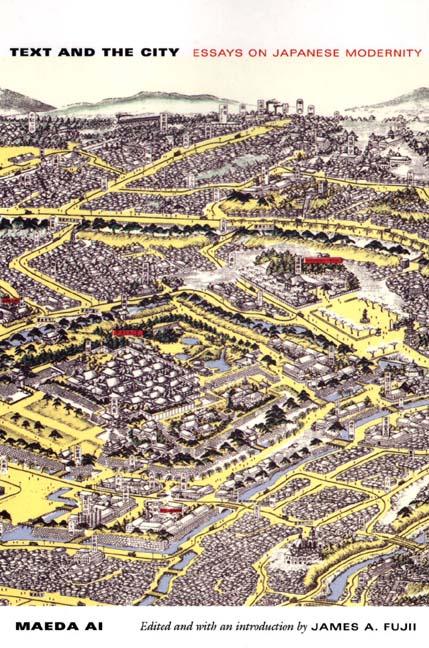
Zustellung: Mo, 04.08. - Fr, 08.08.
Versand in 3 Wochen
VersandkostenfreiBestellen & in Filiale abholen:
The first translation into English of essays on modern Japanese literature, culture, and urban ethnography written by the late Ai Maeda, arguably the most prominent 20th century Japanese literary and cultural critic.
Inhaltsverzeichnis
Acknowledgments vii
Foreword: A Walker in the City: Maeda Ai and the Mapping of Urban Space / Harry Harootunian xi
Introduction: Refiguring the Modern: Maeda Ai and the City / James A Fujii 1
LIGHT CITY, DARK CITY: VISUALIZING THE MODERN
>
1. Utopia of the Prisonhouse: A Reading of In Darkest Tokyo / Seiji M. Lippit and James A. Fujii 21
2. The Panorama of Enlightenment / Henry D. Smith II 65
3. The Spirits of Abandoned Gardens: On Nagai Kafu’s “The Fox” / William F. Sibley 91
PLAY, SPACE, AND MASS CULTURE
4. Their Time as Children: A Study of Higuchi Ichiyo’s Growing Up (Takekurabe) / Edward Fowler 109
5. Asakusa as Theater Kawabata Yasunari’s The Crimson Gang of Asakusa / Edward Fowler 145
6. The Development of Popular Fiction in the Late Taisho Era: Increasing Readership of Women’s Magazines / Rebecca Copeland 163
TEXT, SPACE, VISUALITY
7. From Communal Performance to Solitary Reading: The Rise of the Modern Japanese Reader / James A. Fujii 223
8. Modern Literature and the World of Printing / Richard Okada 255
CROSSING BOUNDARIES IN URBAN SPACE
9. Ryuhoku in Paris / Matthew Fraleigh 275
10. Berlin 1888: Mori Ogai’s “Dancing Girl” / Leslie Pincus 295
11. In the Recesses of the High City: On Soseki’s Gate / William F. Sibley 329
Afterword / Wiliam F. Sibley 351
Contributors 375
Index 377
Foreword: A Walker in the City: Maeda Ai and the Mapping of Urban Space / Harry Harootunian xi
Introduction: Refiguring the Modern: Maeda Ai and the City / James A Fujii 1
LIGHT CITY, DARK CITY: VISUALIZING THE MODERN
>
1. Utopia of the Prisonhouse: A Reading of In Darkest Tokyo / Seiji M. Lippit and James A. Fujii 21
2. The Panorama of Enlightenment / Henry D. Smith II 65
3. The Spirits of Abandoned Gardens: On Nagai Kafu’s “The Fox” / William F. Sibley 91
PLAY, SPACE, AND MASS CULTURE
4. Their Time as Children: A Study of Higuchi Ichiyo’s Growing Up (Takekurabe) / Edward Fowler 109
5. Asakusa as Theater Kawabata Yasunari’s The Crimson Gang of Asakusa / Edward Fowler 145
6. The Development of Popular Fiction in the Late Taisho Era: Increasing Readership of Women’s Magazines / Rebecca Copeland 163
TEXT, SPACE, VISUALITY
7. From Communal Performance to Solitary Reading: The Rise of the Modern Japanese Reader / James A. Fujii 223
8. Modern Literature and the World of Printing / Richard Okada 255
CROSSING BOUNDARIES IN URBAN SPACE
9. Ryuhoku in Paris / Matthew Fraleigh 275
10. Berlin 1888: Mori Ogai’s “Dancing Girl” / Leslie Pincus 295
11. In the Recesses of the High City: On Soseki’s Gate / William F. Sibley 329
Afterword / Wiliam F. Sibley 351
Contributors 375
Index 377
Produktdetails
Erscheinungsdatum
25. März 2004
Sprache
englisch
Seitenanzahl
408
Autor/Autorin
Ai Maeda
Herausgegeben von
James A Fujii
Verlag/Hersteller
Produktart
gebunden
Gewicht
753 g
Größe (L/B/H)
244/164/31 mm
ISBN
9780822333340
Pressestimmen
"Despite the lamentably premature death of Maeda Ai in 1987, his works have left an incontrovertible mark on the study of early modern and modern Japanese literature. Adopting liberally from phenomenological hermeneutics, cultural anthropology, semiotics, and marxist literary study, Maeda invented new ways of inquiring into the historicity of 'literature,' thereby leading a number of young scholars of Japan in the United States in the direction of what would be generally recognized as 'cultural studies.' In the fields of trans-Pacific Japanese studies, it is no exaggeration to say that Maeda accomplished something comparable to what Raymond Williams did in the English-speaking worlds."--Naoki Sakai, Cornell University "Some of us were fortunate to walk with the scholar Maeda Ai as he quietly, with passion, led us back through the urban history of modern Japanese literary culture. Refusing to forget the ravages of war, he rendered foreign thinking familiar and detail significant. Maeda brought to his readers folklore disciplining children growing up in the alleyways, glimpses of women reading new magazines from within their spaces of confinement, records from colonial travel. Here James A. Fujii and his co-translators pass on Maeda's gifts with interpretations of erudition, respect, and imagination. Bravo and thank you."--Miriam Silverberg, University of California, Los Angeles
Bewertungen
0 Bewertungen
Es wurden noch keine Bewertungen abgegeben. Schreiben Sie die erste Bewertung zu "Text and the City" und helfen Sie damit anderen bei der Kaufentscheidung.









